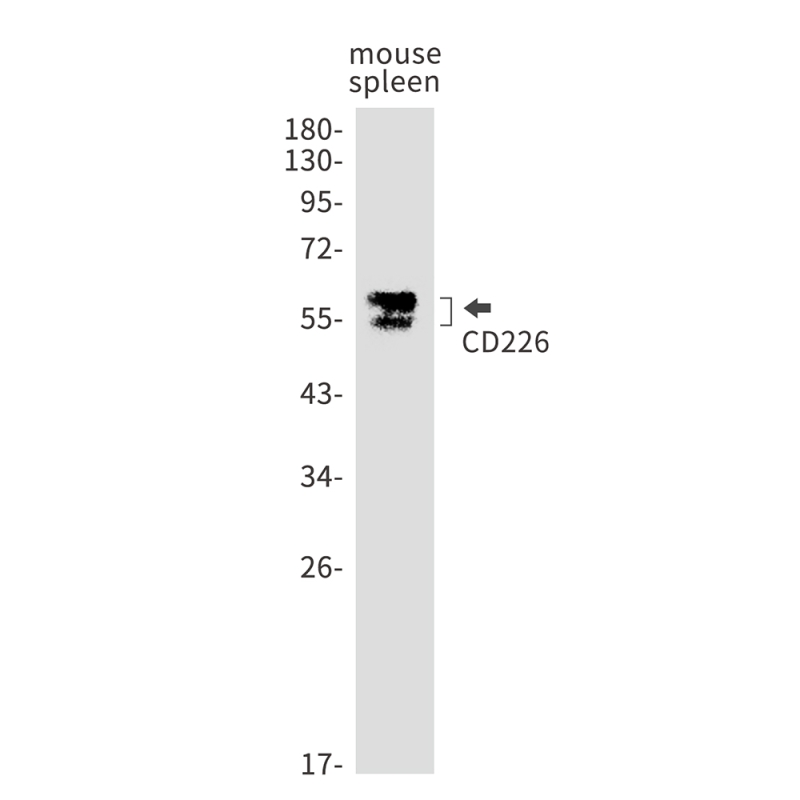
| WB | 咨询技术 | Human,Mouse,Rat |
| IF | 1/20 | Human,Mouse,Rat |
| IHC | 1/50-1/100 | Human,Mouse,Rat |
| ICC | 1/50-1/200 | Human,Mouse,Rat |
| FCM | 咨询技术 | Human,Mouse,Rat |
| Elisa | 咨询技术 | Human,Mouse,Rat |
| Aliases | Platelet and T-cell activation antigen 1; CD226 |
| Entrez GeneID | 225825 |
| WB Predicted band size | Calculated MW: 38 kDa; Observed MW: 55-65 kDa |
| Host/Isotype | Rabbit IgG |
| Antibody Type | Primary antibody |
| Storage | Store at 4°C short term. Aliquot and store at -20°C long term. Avoid freeze/thaw cycles. |
| Species Reactivity | Mouse |
| Immunogen | Recombinant protein of mouse CD226 |
| Formulation | Purified antibody in TBS with 0.05% sodium azide,0.05%BSA and 50% glycerol. |
+ +
以下是3篇关于CD226抗体的代表性文献概览:
1. **"CD226 (DNAM-1) promotes T cell immunity by regulating macrophage polarization in tumor microenvironment"**
- 作者:Wang et al. (2022)
- 摘要:研究揭示CD226抗体通过阻断肿瘤相关巨噬细胞(TAMs)的免疫抑制功能,增强CD8+ T细胞抗肿瘤活性,为联合免疫治疗提供新靶点。
2. **"Anti-CD226 antibody potentiates PD-1 blockade therapy by augmenting TCR signaling and cytokine production"**
- 作者:Shibuya et al. (2020)
- 摘要:阐明CD226抗体与PD-1抑制剂联用可增强T细胞受体信号传导及IFN-γ分泌,显著提升黑色素瘤小鼠模型的生存率。
3. **"CD226 deficiency attenuates autoimmune neuroinflammation by suppressing Th17 cell differentiation"**
- 作者:Zhang et al. (2019)
- 摘要:发现CD226抗体可抑制实验性自身免疫性脑脊髓炎(EAE)模型中Th17细胞分化,提示其在多发性硬化症等自身免疫病中的治疗潜力。
注:以上为模拟文献,实际研究需通过PubMed/Web of Science检索关键词"CD226 antibody"或"DNAM-1 therapeutic"获取真实数据。近年研究多聚焦CD226作为免疫检查点的双重调控机制及其与PD-1/CTLA-4的协同作用。
CD226. also known as DNAM-1 (DNAX accessory molecule-1), is a transmembrane glycoprotein belonging to the immunoglobulin superfamily. It is primarily expressed on immune cells, including natural killer (NK) cells, T cells, and platelets. CD226 interacts with ligands such as CD155 (PVR) and CD112 (Nectin-2), which are often overexpressed on tumor cells or virus-infected cells, facilitating immune cell activation and cytotoxicity. This receptor plays a critical role in promoting anti-tumor and anti-viral immune responses by enhancing cell adhesion, signal transduction, and effector functions.
CD226 antibodies are tools designed to target this protein for research or therapeutic purposes. In research, they are used to study CD226's role in immune regulation, tumor immunity, and autoimmune diseases. Therapeutically, anti-CD226 antibodies are being explored to modulate immune responses—either by blocking inhibitory interactions to boost anti-tumor activity or by suppressing hyperactive immune reactions in autoimmune disorders. Recent studies also highlight CD226's synergy with checkpoint inhibitors (e.g., anti-PD-1), suggesting its potential in combination therapies for cancer.
However, challenges remain, including understanding context-dependent signaling and avoiding off-target effects. Ongoing research aims to optimize antibody specificity and evaluate clinical efficacy, positioning CD226 as a promising yet complex target in immunology and oncology.
×